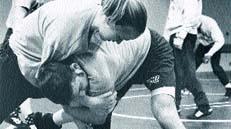 |
 |
| current issue |  |
past issues |  |
send a letter/news |  |
address update |  |
advertise |  |
about us |  |
alumni home |
Features
Taking Life to the MatPage 2 of 3
 No one practices harder than Rebecca Adams '04, the only woman on the
team in the NWCA.
No one practices harder than Rebecca Adams '04, the only woman on the
team in the NWCA.
|
That meeting marked the first time in nearly a decade that wrestlers had gathered at UNH. Through the 1980s, wrestling had been a strong varsity sport here. Competing in the New England Conference against Boston University, Boston College, UMaine, UMass and other Division I programs, the late coach Jim Urquart's wrestlers developed a reputation for being athletic, well conditioned, and well coached. But the 1980s also saw the acceleration of universities scrambling to comply with the requirements of Title IX, the landmark federal legislation requiring equal access to education-and athletics-for women.
One of the key requirements of the law came to be called, simply, "proportionality." It states that a school's percentage of female athletes should match the overall percentage of females in the student body. Many schools, in an attempt to meet that requirement, added women's varsity programs to their athletic departments. But while the number of both men's and women's sports increased overall between 1981 and 1999, more than 400 collegiate men's teams were dropped. The requirement was especially complicated at schools where football programs carried disproportionate numbers of athletes, scholarships, expenses and revenues. At many schools, compliance comes down to football versus several other men's programs. Men's wrestling-a low-revenue, low-prestige college sport-was hit hard over that period, losing a staggering 171 programs.
In the New England Conference, UConn and the University of Rhode Island were the first to drop wrestling in the early 1980s, even though URI was perennially among the nation's top-ranked programs. At UNH wrestling held on for nearly 10 more years. Men's lacrosse, baseball, and the men's and women's golf programs were cut later. Women's crew was granted varsity status.
The shuffling brought the percentages closer, but not all the way there: in a survey of the 301 Division I universities, published in the March 18 issue of U.S. News & World Report, only 12 schools reported a greater than even percentage of female athletes compared with their student populations. UNH, at 56.6 percent- though making U.S. News's Top 20 overall ranking for college athletic programs-was not among them.
"Everyone loves Title IX," says Gary Abbott, a director at USA Wrestling. "It's a great law. It's given women a lot of opportunities. The question is how to enforce it in a fair way?"
In 1997, faced with the alarming number of varsity programs being cut across the country, an organization called the National Collegiate Wrestling Association formed to create an official arena of competition for non-sanctioned clubs. Competing in the NCWA was the goal of the UNH wrestlers who gathered that evening in 1999.
To become a recognized club sport at UNH (there are now 23, up 10 since recreational sports moved from the Field House to the Whitt Center in 1995), students must initiate the interest and persuade a non-peer advisor to oversee the club's management. During a club's first year, the university provides administrative support only-scheduling facility time, providing some equipment, perhaps arranging a small amount of travel. In the second year, the university provides partial funding out of the annual $145 "student recreation fee." The rest of the budget must come through donations and out of the athletes' pockets.
 Coach David Butler demonstrates how to defend against a takedown attack.
Coach David Butler demonstrates how to defend against a takedown attack.
|
The wrestlers passed the first hurdle when David Butler agreed to be their advisor. "I told my wife I'd coach until they got a real coach," says Butler. "That was three years ago." Butler began logging 25 to 30 hours a week outside of his day job. He brought in volunteer coaches from the community, kicked in his own money so the team could travel in something more than the cramped van the recreation department provided, scheduled scrimmages with D-III schools, helped set up an annual summer wrestling camp to raise money for the program. He also reached out to the students. He welcomed them into his office at any hour of the day, advised them about life as well as wrestling. One of his wrestlers was put on academic probation. Butler arranged a job for him in the human resources office, gave him a copy of the book 7 Habits of Highly Effective People and insisted on weekly meetings to monitor his progress. He allowed a woman, sophomore Rebecca Adams, to prove her seriousness and become part of the team, even though he knew he would be barred from competition.
Page: < Prev 1 2 3 Next >Easy to print version

